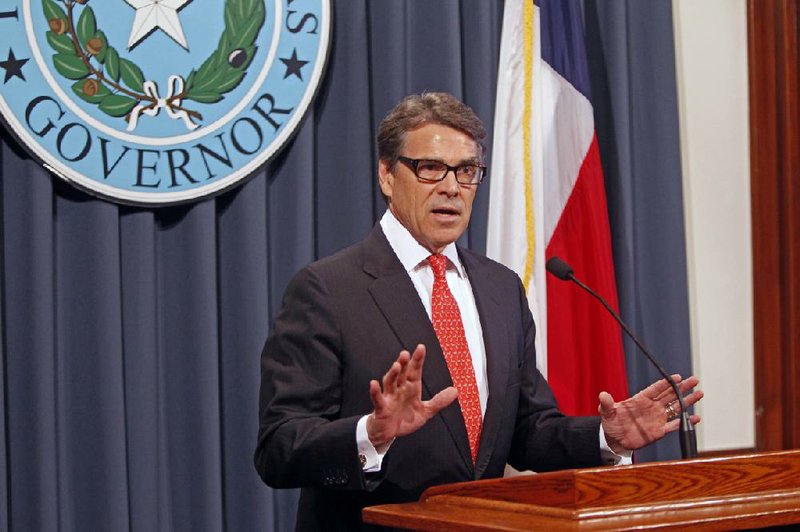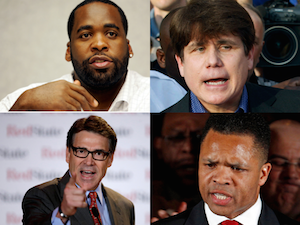Texas Gov. Rick Perry's indictment makes him the third potential 2016 Republican presidential candidate accused of abusing the power of his office, complicating the party's search to find someone to take on Democrat Hillary Clinton, if she were to run.
Perry, 64, was charged Friday on two felony counts by a Texas grand jury investigating his decision to cut off funding for the state's Public Integrity Unit, which was examining a cancer research-funding program championed by the governor.
The grand jury indicted Perry on one count of abuse of official capacity and one count of coercion of a public servant, said Michael McCrum, a special prosecutor handling the case in Texas.
Perry vowed Saturday to fight the indictment against him, calling it an "outrageous" abuse of power.
"This indictment amounts to nothing more than abuse of power, and I cannot and will not allow that to happen," Perry said at a news conference.
An unsuccessful 2012 presidential candidate, Perry tried to remove Travis County District Attorney Rosemary Lehmberg from her post as head of the public integrity office after she was arrested for drunken driving. When the Democrat refused to step down after pleading guilty and completing a brief jail sentence, Perry vetoed $7.3 million for the unit she led.
"The veto in question was made in accordance with the veto authority afforded to every governor under the Texas Constitution," Mary Anne Wiley, Perry's general counsel, said in a statement issued by his office. "We will continue to aggressively defend the governor's lawful and constitutional action, and believe we will ultimately prevail."
Perry, who hired a criminal-defense lawyer to represent him in the probe, explained his decision in the line-item veto that he issued in June.
"Despite the otherwise good work of the Public Integrity Unit's employees, I cannot in good conscience support continued state funding for an office with statewide jurisdiction at a time when the person charged with ultimate responsibility of that unit has lost the public's confidence," he wrote.
His legal problems follow continuing investigations involving Govs. Chris Christie of New Jersey and Scott Walker of Wisconsin, and could bolster the prospects of other Republicans contemplating White House runs, including U.S. Sen. Rand Paul of Kentucky.
In the party's wide-open 2016 primary field, governors were viewed by Republican leaders as having an edge because of the low political standing of members of Congress. Now, Christie is facing multiple probes of politically motivated lane closures and traffic jams in September created by his administration. Walker has seen six former associates or aides convicted on charges ranging from doing political work on government time to stealing public funds.
Democrats pounced on the latest scandal.
"Remember when Republican governors were arguing that Washington could learn from them? Let's hope not," Mo Elleithee, communications director for the Democratic National Committee, said in an email.
Investigations complicate a candidate's messaging, said Ben LaBolt, the national press secretary for President Barack Obama's 2012 re-election campaign.
"It's hard enough to succeed when you just have to win over the voters and the media," said LaBolt, a co-founder of the Democratic communications strategy firm The Incite Agency, which has offices in New York and Washington. "When you add the optical issues that come with a judge, a jury and even the suggestion of corruption, candidates' chances of winning are greatly diminished."
Stuart Stevens, a top adviser to Republican Mitt Romney's 2012 presidential campaign whose consulting firm also worked on Christie's re-election in 2013, said Perry could survive the indictment because of the details of the charges.
"I would imagine that this is one of those cases where public opinion is going to be on Gov. Perry's side pretty quickly," Stevens said. Voters will judge that Perry was "acting in the public's best interests," he said.
Texas Republican Sen. Ted Cruz, another potential contender for his party's presidential nomination, came to Perry's defense.
"The Texas Constitution gives the governor the power to veto legislation, and a criminal indictment predicated on the exercise of his constitutional authority is, on its face, highly suspect," Cruz said in a statement.
Texans for Public Justice, an Austin-based group that says it fights political corruption, said Perry may have intentionally cut the ethics unit's funding in a bid to shut down a probe of the Cancer Prevention Research Institute of Texas. The justice group calls it "one of the governor's signature corporate subsidy programs."
Craig McDonald, director of the justice group, praised the grand jury's decision.
"He will have to stand trial and be held accountable for this," he said. "It's serious stuff."
Information for this article was contributed by Paul J. Weber of The Associated Press.
A Section on 08/17/2014

